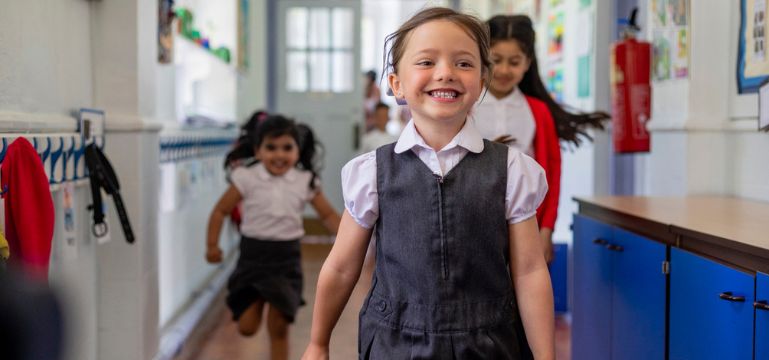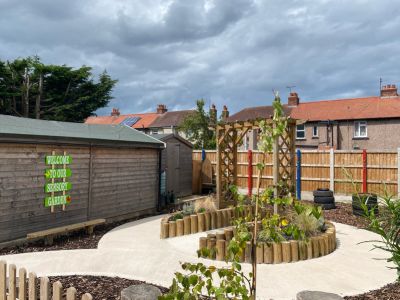A whole school approach to well-being using a scientific model

Quick links:
Information about the school
Ysgol Emmanuel is a two form entry English medium primary school in Rhyl. The school is located in an area of multiple deprivation and the school catchment area covers two of the most deprived areas in Wales. There are 460 pupils on roll and 63% of pupils are eligible for free school meals, significantly higher than the average for the local authority and Wales. Currently 7% of pupils have English as an additional language with 11 different languages spoken. Currently 3% of pupils are looked after or previously looked after. The school also has a school funded resource provision for ALN pupils.
The school vision is that ‘as a community, we learn, grow and achieve together’. The main aims of the school are to help young people to understand how to be happy and to develop and maintain their own emotional, physical and mental well-being; to be inclusive; to create a community that builds tolerance, respect and empathy in young people; to reduce the impact of poverty on outcomes and well-being for pupils and to further the professional development of staff. This whole school approach aligns with all of these aims.
Context and background to the effective or innovative practice
The school is located in an area of high deprivation and as such, has high numbers of pupils with adverse childhood experiences (ACEs). It is a priority to improve pupil engagement and to support educational and emotional success. Historically, some pupils had struggled with self-regulation which impacted on learning and engagement. There were rising numbers of pupils with other learning needs and they needed bespoke support to help them to achieve. The school recognised that a different approach was needed as the existing style of pupil well-being and behaviour management was not working effectively. It was agreed that a research based trauma informed approach was needed. This would allow staff to understand the needs of pupils and how trauma and adverse childhood experiences may be a barrier to learning and succeeding.
Description of nature of strategy or activity
After evaluating provision in the school, senior members of staff completed professional learning which focused on neuroscience, toxic stress, attachment theory and mental health and well-being for pupils. This evidence based training explained the effects of toxic stress and confirmed the reasons behind much of the negative behaviour or worsening pupil mental health that had been observed in school. As this change in mindset required a whole school approach, training for all staff which focused on the use of trauma informed approaches including attachment theory and the detrimental effects of ACEs on pupils was rolled out. This professional learning offer also focused on different strategies to regulate and calm pupils and the importance of an emotionally available adult for every child if required.
A graduated response for pupils was introduced to meet their individual needs using the same approach as for pupils with additional learning needs (ALN) in line with the new requirements of the ALN bill. Well-being assessment tools, referrals from professionals or requests from parents and carers were used to identify pupils with the most urgent need of intervention. Once the approach had been implemented, professional learning was extended to include training additional staff in trauma informed practitioner approaches and additional support staff were trained to deliver a wider range of bespoke well-being interventions as well as restorative justice practice. A qualified play therapist, based at the school two days per week, was recruited to support pupils with the highest need. Senior leaders including the additional learning needs coordinator (ALNCo) implemented a meet and greet every morning on the school gates to give parents and carers the opportunity to express any concerns before pupils start their school day. Staff meet and greet pupils at the classroom door. Daily check-ins with pupils who were reluctant or who needed additional support to come into the school building were implemented by the well-being team. A trained assistance dog provided gentle and friendly support to pupils. Staff were also trained in child mental health first aid and the school became a case study for the CAMHS inreach pilot programme.

Behaviour management policies, procedures and strategies were adapted to change the school’s approach to behaviour and well-being and to focus on the positive rather than the negative. The physical school environment was adapted to better meet the needs of pupils and to reinforce this approach; calming corners were introduced in classrooms and sensory spaces were created to help pupils to regulate if they were heightened. Strategies to support pupils to regulate their behaviour and emotions were re-introduced and a dedicated well-being team was created to provide direct support for pupils. Following on from this trauma informed approach, the school worked collaboratively with local schools to support refugee pupils who had recently arrived in the area having experienced the trauma of war or persecution.

What impact has this work had on provision and learners’ standards?
The school’s approaches changed the mindset of staff and made them more aware of the signs of poor mental health or the effects of adverse childhood experiences on behaviour and engagement. This allowed senior leaders to put the most appropriate support in place for pupils. Standards have improved due to better levels of pupil self-regulation and engagement; in addition levels of exclusion have fallen and negative behaviour incidents have reduced. The school is a calmer environment and as a result, pupils are ready to learn and able to achieve their potential. Attendance levels are returning to pre-pandemic levels and pupils feel safe and cared for at school.